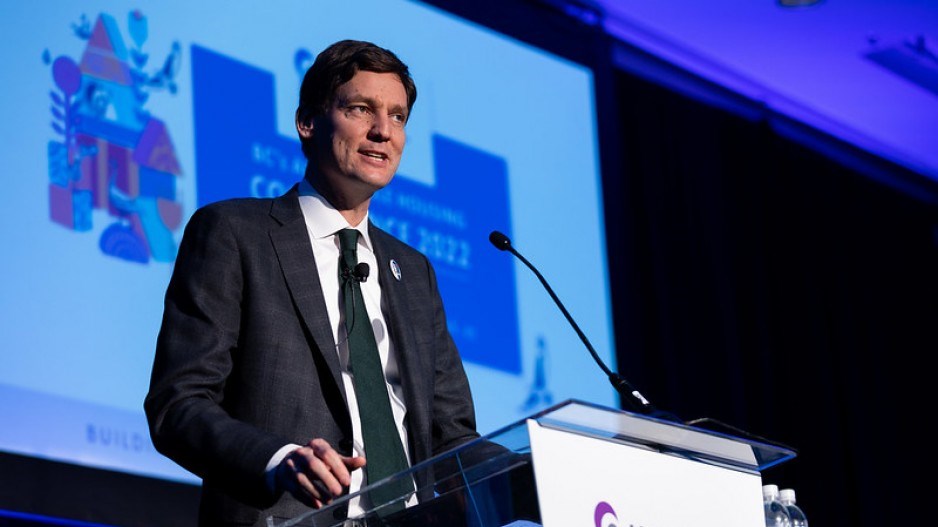Premier David Eby is walking back two key promises from his leadership campaign – a new provincial mental health facility, and a proposal to involuntarily detain people who overdose for treatment.
Eby admitted in a year-end interview that it’s possible neither will actually happen now that he’s taken office, despite the proposals being early centrepieces of his leadership bid and areas in which he’s made very specific pledges for action.
Eby said his leadership ideas were just that – ideas that he’s now turned over to more knowledgeable experts to figure out whether they are viable or should be shelved in favour of different solutions.
“My opinion is we can do better than having somebody get NARCAN, come-to in the emergency room and then be released later only to be returned to the emergency room again,” said Eby.
“But I'm not an expert in this area. So working with physicians, working with experts in addiction, mental health, about how we intervene and break that cycle for that person is going to be vital.”
Gone is the surety Eby displayed during his leadership bid, in which he detailed at length in multiple interviews his proposal to force treatment on people who overdose multiple times in a bid to save them from dying on the street due to the toxic drug supply.
“This policy of non-intervention is one that can’t continue,” Eby said in an Aug. 23 interview. “If we can prevent some deaths and intervene earlier to support people, so that they at least have a shot, I think we should do it.”
Or, earlier in August to Postmedia: “Currently under our system … the intervention can only come once they’ve seriously brain-injured themselves through an overdose. We need to have better interventions and that could include and should include involuntary care for people to make sure they at least have a chance.”
It was a controversial idea, opposed by civil liberties experts, but Eby stuck with it for several months.
When pushed now on why he’s moderating his position, Eby reiterated that there are others at his disposal as premier who perhaps know better what to do.
“I think it’s correct to say that we’re going to be guided by experts in this area, and what will be effective,” he said.
“I’m not married to any one particular response, but it needs to be effective. So when I heard about that issue of these multiple overdoses in the emergency room, it’s like, well, what can we do? How can we intervene and stop this from happening? And so that’s what we’ll be asking these experts, and we’ll see what their best recommendations are.”
In addition to throwing doubt over involuntary treatment, Eby is also hedging away from a new, modern provincial mental health facility to replace the shuttered Riverview hospital.
“When I say Riverview, sometimes people hear just mental health beds, sometimes they hear more hospitals, sometimes they think of the specific Riverview site,” he said.
“So it means a bunch of different things to different people. The core of it is that we need to have those beds and those services in place across the province.”
Instead of a new provincial mental health centre, it may simply be a series of new treatment beds opened at sites throughout the province.
“Making sure those beds are in place, maybe in different communities, maybe at the Riverview site, that we have them in the right place for when people need them” is the goal, said Eby.
“Moving people from across the province to one centre brings a lot of other challenges,” he added. “So we want to do it right.”
Eby in the past has repeatedly blamed the closure of Riverview, done in phases over the late 1990s and early 2000s, as one of the causes of homelessness, addiction and street disorder in Vancouver’s Downtown Eastside.
He’s left the distinct impression that a new mental health facility was top-of-mind for when he assumed power. But now here, too, that has morphed into a somewhat vague consultation with a larger group of experts to inform a future action plan.
“Riverview is going to represent more than what it historically was, which was a really old and outdated hospital around mental health issues,” said Eby.
“But the idea that we don’t have enough capacity for people that need serious mental health and addiction interventions, they really need that support, is true.”
Eby said he’ll be relying on Jennifer Whiteside, his new mental health and addictions minister, to assess the system and tell him what kinds of services are needed and where, so that a person who overdoses can get “seamless” treatment from the hospital, to detox, treatment and recovery.
“I don't want the situation to be that a doctor who is facing someone who's a danger to themselves or to other people makes a decision based on whether or not there's a quality bed available,” he said.
Eby insists his stated goals remain the same on mental health and addictions.
But it seems clear he’s double-checking and reconsidering some of his campaign promises now that he’s taken office and is faced with the reality of implementing them.
Rob Shaw has spent more than 14 years covering B.C. politics, now reporting for CHEK News and writing for Glacier Media. He is the co-author of the national bestselling book A Matter of Confidence, and a regular guest on CBC Radio.



